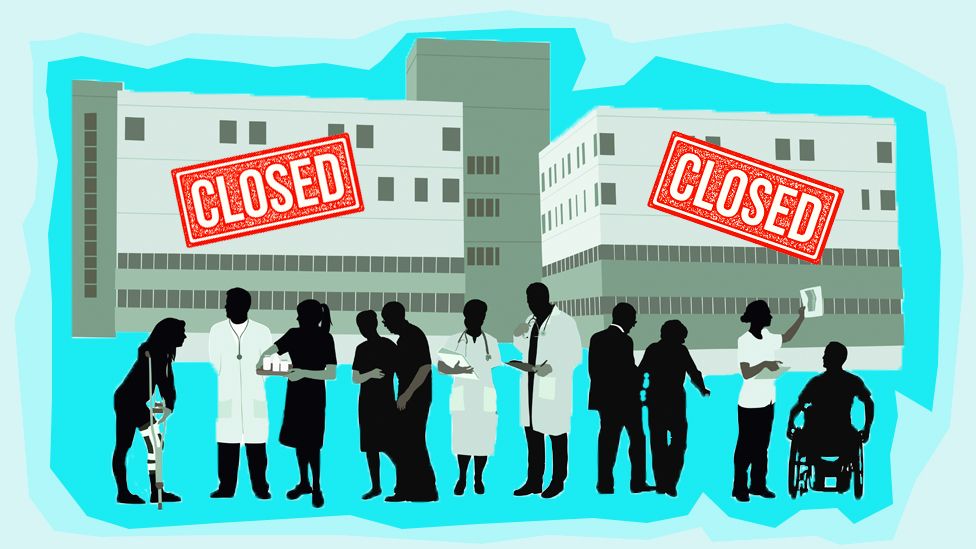Hospital cuts planned in most of England
- Published
- comments

Hospital services in nearly two-thirds of England could be cut or scaled back, a BBC analysis of local plans shows.
The proposals are part of a programme to transform the health service and save money across 44 different areas.
The BBC found 28 proposals affect hospital care, from full closures to centralising services, such as A&E and stroke care, on fewer sites.
NHS England argue patients will receive better care in the community to compensate for the hospital cuts.
The proposals also include the creation of "super" community hubs of GPs, care workers and district nurses, seven-day access to GPs and getting hospital specialists to run clinics in the community.
But the scale of the changes, which have not been consulted on, has caused concern.
The BBC analysis found:
- Plans to reduce the number of major hospital sites in Leicester, Leicestershire and Rutland from three to two
- In the Black Country they are planning to reduce the overall number of major hospitals by one, although a new hospital is being built
- Maternity and children's services being "centralised" on to one site in Lincolnshire
- A warning in West Yorkshire and Harrogate that having five hyper-acute stroke services may "no longer be viable"
- The downgrading of two out of three A&Es in Mid and South Essex, with only one retaining specialist emergency care
- In South West London, proposals to reduce the number of major hospitals from five to four
- Plans in Nottinghamshire to significantly downsize City Hospital and reduce the number of beds across Nottingham by 200
- In Cambridgeshire and Peterborough, consideration being given to centralising specialised orthopaedic trauma services at two local hospitals
Overall, a third of the 44 plans look to reduce the number of hospitals providing emergency care, while in another third of areas they have said they will consider moving non-emergency care to fewer sites.
Sorry, your browser cannot display this content.
Need help finding out which region you are in? See the map at the foot of the page.
Plans 'not credible'
The King's Fund think-tank warned that a lack of investment meant the ideas being put forward were not always credible.
Chief executive Prof Chris Ham warned that community services in many areas were already "feeling the strain" and could not cope with an increase in workload.
And he said further reductions in the number of hospital beds could destabilise services that were already "stretched to their limits" following the difficult winter.
But Prof Ham said they were still the "best hope of delivering essential reforms" in the NHS, as care needed to be moved out of hospital.
This is seen as vital because the ageing population and growth in long-term conditions, such as dementia and heart disease, mean people are more likely to benefit from support in the community to stay well rather than inpatient hospital care when their health deteriorates.
The proposals - known as sustainability and transformation plans - have been drawn up as part of NHS England's five-year strategy to release £22bn of efficiency savings by 2020.
Reviews were set up in early 2016 and consultations on major changes are expected to take place later this year with the hope that implementation will follow soon after.
But the King's Fund warned that the changes could be subject to legal challenges.
Extra money set aside
A £1.8bn pot has been set aside this year to help fund transformation, but figures released last week showed that has been used to shore up NHS trust finances as they struggle to balance their books.
But a Department of Health spokesman maintained that the extra money being invested in the NHS this Parliament still gave the health service enough funds to change the way it worked.
"These NHS plans - developed by local doctors, hospitals and councils working together with the communities they serve - will help patients get better care," he added.
NHS England, which is overseeing the plans, said they offer the best hope of improving patient care in a sustainable way.
"They will allow the NHS to take advantage of new technologies, adopt successful practice more widely, and make practical improvements in areas that we know matter most to patients," a spokeswoman added.
Need more help finding your local NHS area?
1. Northumberland, Tyne and Wear
2. West, North and East Cumbria
3. Durham, Darlington, Tees, Hambleton, Richmondshire and Whitby
4. Lancashire and South Cumbria
5. West Yorkshire
6. Coast, Humber and Vale
7. Greater Manchester
8. Cheshire and Merseyside
9. South Yorkshire and Bassetlaw
10. Staffordshire
11. Shropshire and Telford and Wrekin
12. Derbyshire
13. Lincolnshire
14. Nottinghamshire
15. Leicester, Leicestershire and Rutland
16. The Black Country
17. Birmingham and Solihull
18. Coventry and Warwickshire
19. Herefordshire and Worcestershire
20. Northamptonshire
21. Cambridgeshire and Peterborough
22. Norfolk and Waveney
23. Suffolk and North East Essex
24. Milton Keynes, Bedfordshire and Luton
25. Hertfordshire and West Essex
26. Mid and South Essex
27. North West London
28. North Central London
29. North East London
30. South East London
31. South West London
32. Kent and Medway
33. Sussex and East Surrey
34. Frimley Health
35. Surrey Heartlands
36. Cornwall and the Isles of Scilly
37. Devon
38. Somerset
39. Bristol, North Somerset and South Gloucestershire
40. Bath, Swindon and Wiltshire
41. Dorset
42. Hampshire and the Isle of Wight
43. Gloucestershire
44. Buckinghamshire, Oxfordshire and Berkshire West
- Published14 November 2016
- Published26 August 2016
- Published25 August 2016
- Published5 August 2016
- Published15 March 2016